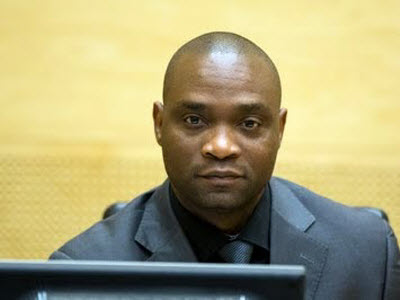
On 7 March 2014, Germain Katanga was found guilty, as an accessory, of one count of crimes against humanity (murder) and four counts of war crimes (murder, attacking a civilian population, destruction of property and pillaging) committed on 24 February 2003 during the attack on the village of Bogoro, in the Ituri district of the Democratic Republic of the Congo (DRC).
At a public hearing today, Presiding Judge Bruno Cotte delivered a summary of the Chamber's decision. He explained that when determining the sentence, the Chamber had to consider the legitimate need for truth and justice voiced by the victims and their family members, while seeking also to ensure that the sentence acts as a deterrent to potential perpetrators of similar crimes.
The Presiding Judge also set out the aggravating or mitigating factors taken into consideration by the Chamber in determining the sentence, which should be in proportion to the crime and the culpability of the convicted person. Those factors, the purpose of which is to give meaning to the penalty imposed in light of the specific circumstances of the case, included , inter alia, the gravity of the acts committed by the accused from both a qualitative and a quantitative point of view. The Judges also took account of the form and degree of the accused's participation in the crime in question.
With regard to the gravity of the crimes, the Chamber stressed that the crimes committed on 24 February 2003 in Bogoro were committed with particular cruelty, resulted in numerous civilian victims, and that the scars of the fighting can still be seen today. The Chamber considered that the scope of the crimes was undeniable, including on account of their clearly discriminatory aspect vis-à-vis the mainly Hema population living in Bogoro at that time.
Turning to Germain Katanga's degree of participation and intent, the Chamber considered that he had made a significant contribution to the commission of the crimes of attacking a civilian population, murder, pillage and destruction of property and that said contribution had been made in the knowledge of those crimes.
Nonetheless, the Chamber considered, in determining the sentence, that account had to be taken of Germain Katanga's conduct after the events and, in particular, his active participation in the demobilisation process implemented in Ituri for the benefit of the child soldiers and, to a certain extent, of his personal situation.
Lastly, absent any factors that might call into question Germain Katanga's financial situation, the Chamber did not impose a fine.
Background: On 7 March 2014, Trial Chamber II found Germain Katanga guilty, as an accessory within the meaning of article 25(3)(d) of the Rome Statute, of one count of crime against humanity (murder) and four counts of war crimes (murder, attacking a civilian population, destruction of property and pillaging) committed on 24 February 2003 during the attack on the village of Bogoro, in the Ituri district of the DRC. The Chamber acquitted Germain Katanga of the other charges that he was facing. The Prosecutor and the Defence appealed the judgment. Decisions on possible reparations to victims will be rendered later.
Related articles
- • UN Security Council Calls on Rwanda to Stop Supporting M23 Rebels in DR Congo (February 22, 2025)
- • 'Deadly environment' plus 'political and social' obstacles hinder Ebola fight, Security Council hears (July 24, 2019)
- • Ebola outbreak declared an international Public Health Emergency (July 17, 2019)
- • Jean-Pierre Bemba named MLC presidential candidate (July 13, 2018)
- • At least 30 dead after massacres in Ituri (March 2, 2018)
- • ICC Confirms 14-Year Sentence Against Thomas Lubanga (December 1, 2014)
- • ICC Case Against Bemba Wrapping Up as Another Opens (November 12, 2014)
- • ICC confirms war crimes charges against Bosco Ntaganda (June 10, 2014)
- • ICC finds Germain Katanga guilty of war crimes and crime against humanity (March 7, 2014)
- • Bosco Ntaganda Attacked Civilians on Ethnic Grounds, ICC Prosecutor Says (February 10, 2014)
- • U.S. Sanctions Rwanda Over Use of Child Soldiers by M23 Rebels (October 4, 2013)
- • DR Congo Asks Rwanda to Turn Over M23 Rebel Leaders (July 26, 2013)
- • Rebel Leader Bosco Ntaganda Makes First Appearence Before the ICC (March 26, 2013)
- • Bosco Ntaganda in the International Criminal Court's custody (March 22, 2013)
- • Warlord Bosco Ntaganda Turns Himself In at US Embassy in Rwanda (March 18, 2013)
- • Obama Tells Kagame to Stop Support for M23 Rebels in Eastern Congo (December 19, 2012)
- • International Criminal Court Acquits Mathieu Ngudjolo Chui (December 18, 2012)
- • U.S. Sanctions M23 Rebel Leaders (December 18, 2012)
- • The M23 Rebels Want to Overthrow Kabila? Nonsense (November 28, 2012)
- • U.S. Treasury Department Sanctions M23 Rebel Leader (November 13, 2012)
- • UN Security Council condemns 'any and all outside support' to M23 rebels (October 19, 2012)
- • M23 Rebels Committing War Crimes (September 11, 2012)
- • Kagame May Face War Crimes Charges at the ICC, Says US Official (July 26, 2012)
- • US Cuts Military Aid to Rwanda Over Support to Rebels in DR Congo (July 21, 2012)
- • DR Congo, Rwanda Sign Pact to Fight Rebels in Eastern Congo (July 15, 2012)
- • Thomas Lubanga sentenced to 14 years (July 10, 2012)
- • U.S. Tells Rwanda to Stop Supporting Rebels in DR Congo (July 2, 2012)
- • Kagame Is A Problem for The U.S. and The U.K. (June 23, 2012)
- • ICC Prosecutor Seeks 30 Years for Thomas Lubanga (June 13, 2012)
- • Congo Army Advances On Rebels Holdout, Says Official (June 5, 2012)







